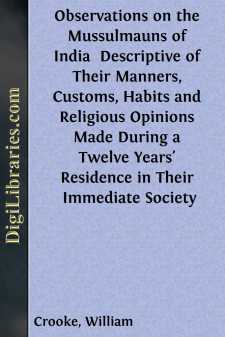History
- Africa 30
- Americas (North Central South West Indies) 50
- Ancient 68
- Asia 58
- Australia & New Zealand 8
- Canada 41
- Caribbean & West Indies 1
- Civilization 20
- Eastern Europe 12
- Europe 310
- Expeditions & Discoveries 60
- General 77
- Historical Geography 1
- Jewish 9
- Latin America 3
- Medieval 8
- Middle East 13
- Military 248
- Revolutionary 8
- Study & Teaching 5
- United States 353
- Western Europe 56
- World 13
History Books
Sort by:
by:
George Lunt
INTRODUCTION. The Editor of this little volume does not deem it incumbent upon him to explain in what way the author’s manuscript came into his possession. He hopes it may be enough for him to say, that the writer believed himself to be the only person whose memory retained most of the incidents and anecdotes herein recorded; and a long and familiar acquaintance with his character enables the Editor...
more...
CHAPTER Mackinaw and its surroundings — Indian legends — Hiawatha — Ottawas and Ojibwas — Paw-pau-ke-wis — San-ge-man — Kau-be-man — An Indian custom — Dedication to the spirits — Au-se-gum-ugs — Exploits of San-ge-man — Point Ignatius — Magic lance — Council of Peace — Conquests of San-ge-man. Mackinaw, with its surroundings, has an interesting and romantic history, going...
more...
by:
Peter Langley
FOREWORD I would merely say a few words in justification of the Historical Romance, in its relation to history. Any one, with no preceding profound study of history, who takes a few well-known historical facts as a foundation for an airy castle of romantic invention and fantastic adventure, may easily write an Historical Romance; for him history is only the nude manikin which he clothes and adorns...
more...
CHAPTER I. JANUARY."Come then, come then, and let us bringUnto our pretty Twelfth-Tide King,Each one his several offering."Herrick'sStar Song. Dedication Festivals—New Year's Day—"Wassail"—Twelfth Night—"King of the Bean"—St. Distaff's Day—Plough Monday—Winter Games—Skating—Sword-dancing. N the old life of rural England few things are more...
more...
by:
Thomas Hodson
Preface. I can now, in my mind’s eye, see Chickka, the washerman, as if I had met him yesterday; and I can see the mud houses of Singonahully, the mud wall of the village, and the temple of Runga, as if they were all before me. Yet five and thirty years are passed and gone since the afternoon when, in quest of medical aid, I rode past the village, hoping yet to see it the abode of many follower’s...
more...
by:
William Crooke
INTRODUCTION Very little is known about the authoress of this interesting book. She is reticent about the affairs of her husband and of herself, and inquiries recently made at Lucknow, at the India Office, and in other likely quarters in England, have added little to the scanty information we possess about her. The family of her husband claimed to be of Sayyid origin, that is to say, to be descended...
more...
by:
Ward Muir
I The sergeant in charge of the clothing store was curt. He couldn't help it: he had run short of tunics, also of "pants"—except three pairs which wouldn't fit me, wouldn't fit anybody, unless we enlisted three very fat dwarfs: he had kept on asking for tunics and pants, and they'd sent him nothing but great-coats and water-bottles: I could take his word for it, he wished...
more...
by:
Philip Gibbs
I When Germany threw down her challenge to Russia and France, and England knew that her Imperial power would be one of the prizes of German victory (the common people did not think this, at first, but saw only the outrage to Belgium, a brutal attack on civilization, and a glorious adventure), some newspaper correspondents were sent out from London to report the proceedings, and I was one of them. We...
more...
Adolfo Rodriguez was the only son of a Cuban farmer, who lived nine miles outside of Santa Clara, beyond the hills that surround that city to the north. When the revolution in Cuba broke out young Rodriguez joined the insurgents, leaving his father and mother and two sisters at the farm. He was taken, in December of 1896, by a force of the Guardia Civile, the corps d’élite of the Spanish army, and...
more...
BRUMAIRE. THE OVERTHROW OF THE FRENCH DIRECTORY. The eighteenth century went out with the French Directory, and the nineteenth came in with the Consulate. The coincidence of dates is not exact by a year and a month and twenty-one days. But history does not pay much attention to almanacs. In general our century arose with the French Consulate. The Consulate was the most conspicuous political fact of...
more...











